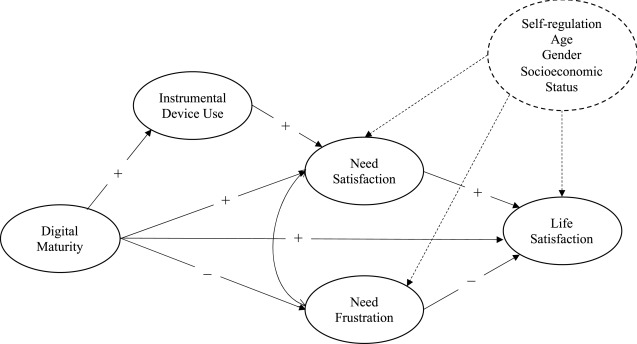Research conducted by EU-funded DIGYMATEX project researchers confirmed that digital maturity – a measurement based on ten aspects of positive online behaviour identified by DIGYMATEX – is positively associated with well-being, and that the association is partially mediated through psychological need satisfaction versus frustration.
“The results indicate that a self-determined use of digital technologies (i.e., digital maturity) may support well-being while shielding against threats and dangers to well-being, and that psychological needs satisfaction and frustration are important mechanisms of these relationships,” the researchers explained.
“Digital maturity was found to be positively related to well-being and inversely related to ill-being in adolescents. Psychological need satisfaction and frustration mediated these relationships.”
Online behaviour characterised by digital maturity contributes to the teens’ psychological growth and social adjustment, and correlates positively with reduced negative device use, they added. Indicators of well-being used in the research included life satisfaction, positive affect, and psychological richness, whereas ill-being is characterised by negative affect and psychological distress.
“The findings highlight the role of digital maturity in promoting well-being and reducing potential digital threats,” as well as “the need to support young people in becoming mature users of digital technologies, enabling them to use digital opportunities to benefit their overall well-being”, the researchers said.
Franziska Laaber, Teresa Koch and Arnd Florack of the University of Vienna Faculty of Psychology’s Department of Occupational, Economic and Social Psychology carried out the research, together with DIGYMATEX coordinator Marco Hubert of Aarhus University’s School of Business and Social Sciences (Aarhus BSS). The team published their work under the title “Young people’s digital maturity relates to different forms of well-being through basic psychological need satisfaction and frustration” for the March 2024 issue of the scientific journal Computers in Human Behavior.
In the article, the team presented the results of the two parallel studies they conducted, which focused on a total of 641 teens aged 12-18 in Austria and in Germany, and included input from their parents.
“We found that adolescents with a higher digital maturity are more likely to use mobile devices in an instrumental, goal-directed way,” the researchers said. “Our research contributes to the understanding of the mechanisms underlying the association between digital maturity and indicators of overall well-being beyond personal and family resources, including self-regulation, age, gender, and socioeconomic status.”
“In the current paper, we investigated whether digital maturity is associated with psychological need satisfaction and well-being for the first time,” the researchers commented.
“The finding that digital maturity is positively associated with well-being is intriguing, particularly because of the wide range of well-being measures used, including affect, satisfaction, and psychological richness, none of which are directly related to digital activities. It is also not trivial that some kind of mature behavior, such as using digital technologies to learn something new or achieve one’s own goals, is related to well-being. Indeed, mature behavior can be related to short-term frustrations just because immediate rewards are foregone.”
The researchers noted that an “interesting question” not addressed in the study is “whether digital maturity can influence well-being, which is known to be largely determined by genetic factors and temperament, or whether the correlation is produced by the factors more deeply rooted in the personality of individuals.”
Nonetheless, the team posits that “digital maturity is related to what individuals do in their daily lives and which increases satisfaction of autonomy, competence, and relationship needs”, citing research indicating that a “remarkable proportion” of individual variance in well-being – roughly 40% – can be attributed to modulation by individuals through engagement in intentional activities in their daily lives. “Digital maturity may influence how individuals pursue and select these intentional activities”, the researchers suggested.
The researches stressed that they controlled for general self-regulation skills in the two studies presented, meaning that “the observed relationship between digital maturity and well-being cannot be explained by individual differences in general self-regulation skills and is in line with the idea that digital maturity covers abilities that specifically address the challenges and opportunities of digital technologies.”


